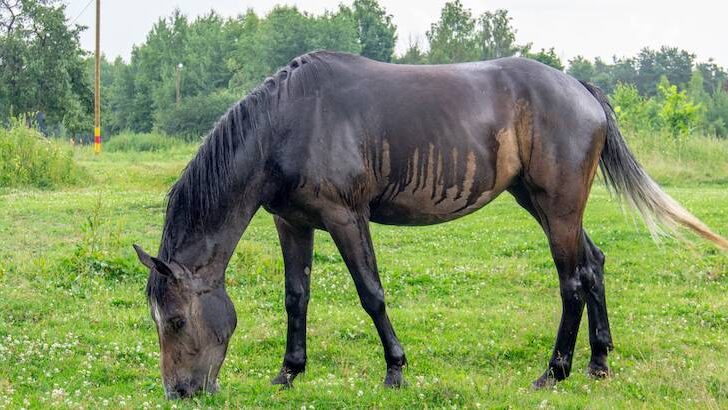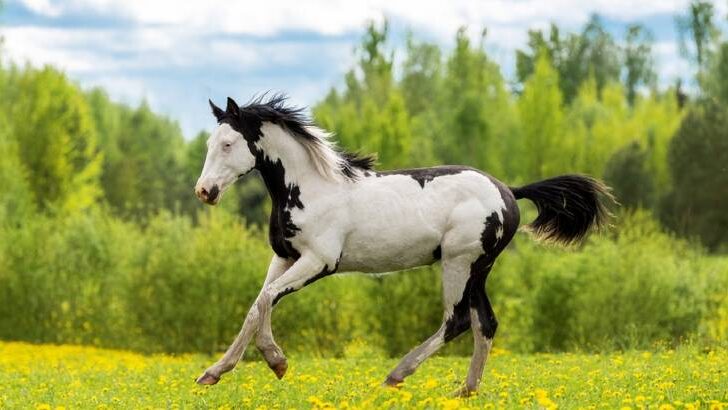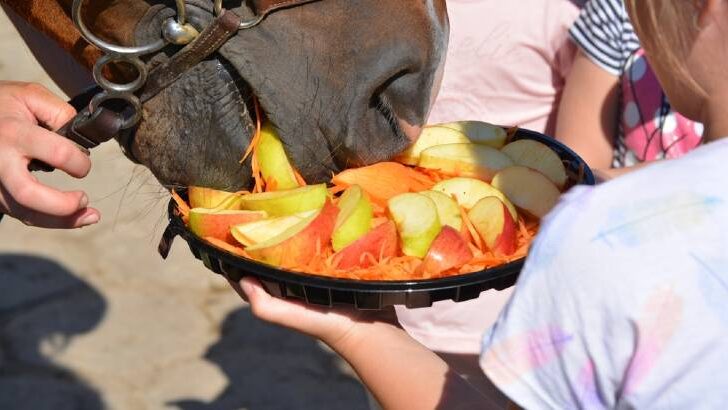Affiliate Disclaimer
As an Amazon Associate I earn from qualifying purchases. It helps me keep the website going. Thank you for your support.
Exactly how horses are affected by exposure to rain is a question many horse owners have. Do horses get cold in the rain? How much rain can they comfortably handle? Are they prone to any illnesses after standing in the rain? Let’s dive right into the answer.
The short answer is that horses get cold in the rain. This is particularly true if they stand in the rain long enough for the rain to soak through their coats to their skin. This reduces their body temperature.
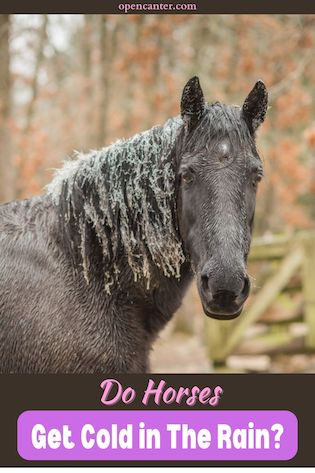
Factors That Impact if Horses Get Cold in The Rain
The extent to which being cold from rain impacts a horse depends on their breed, the thickness of their coat, their diet and general health, and the overall weather conditions.
Breed
Certain horse breeds that originate from colder and more extreme climates tend to handle rain and being cold much better than those from tropical climates. These breeds include Icelandic Horses, Kabarda Horses, and Finn Horses. These breeds have naturally very thick coats that protect them from the rain and the wind and keep them warm.
The Thickness of Their Coat
It is true that horses are extremely resilient when it comes to bracing the elements. In cooler climates, they develop extremely thick coats that provide an extra layer of warmth. This thicker coat for horses in the wild often means they don’t need any other protection from the rain and cold.
For domestic horses, blankets are used to add an additional layer of warmth in rainy conditions. This is because horses have adapted over time and domesticated horses tend to develop less thick coats in colder months.
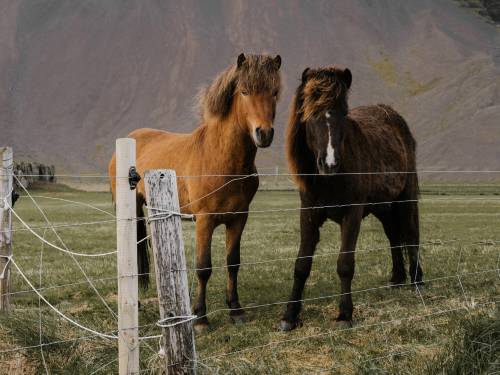
Diet & General Health
A horse’s diet impacts its overall health and well-being which in turn impacts its ability to withstand the impact of rain. A well-balanced diet will ensure that your horse has sufficient fat stores to provide an additional layer of protection against the cold.
Horses that are skinny or have poor diets, will find it more difficult to regulate their temperature. The same is true for much older horses and foals.
Overall Weather Conditions
Horses are impacted differently depending on whether they are exposed to warm or cold rain. Rain after a hot summer’s day or in a generally warmer climate, will not always lead to a horse getting cold. The presence of cold wintery winds will usually lead to a horse getting colder more quickly.
Possible Health Issues When Horses Get Cold in The Rain
When a horse gets too cold from being in the rain, they become more vulnerable to certain illnesses and diseases (much like humans and other animals).
The most common illness is equine influenza which is much like the common cold that humans get. Horses who have this may have a runny nose, cough, a higher temperature, and may lose their appetite.
When horses get cold in the rain, they can also be susceptible to winter colic. This is because when horses are cold, they tend to drink a lot less water. This makes it more difficult for them to digest the food they eat and can lead to digestion issues and colic.
Rain rot is another risk for horses left out in the rain. It is a skin infection caused by a bacterium that lives dormant on horses’ skin. When skin is exposed to moisture for extended periods of time, rain rot can develop. It leads to raised skin and scabs typically along their back and hind and can be painful if left untreated.
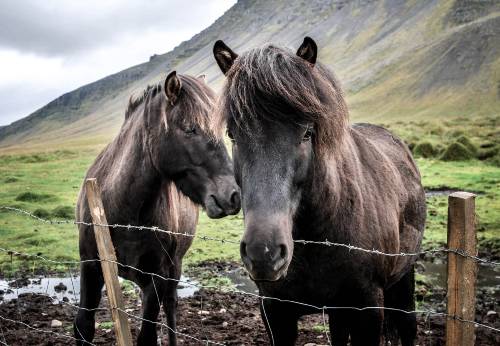
Signs That a Horse May be Cold
There are a few signs to look out for that indicate that your horse may be getting cold in the rain. The first is shivering. Much like people and other mammals, horses shiver and shake when they are cold.
Shivering is a natural reaction to cold that helps horse regulate their temperature. If you notice that a horse is shivering, it is a sure sign they are cold.
A horse that is cold from the rain may also adjust their posture in reaction to the discomfort. They will tuck their tails in tightly between their hind legs to prevent any unnecessary heat loss. A cold horse may also attempt to huddle closer to other horses in the herd for more warmth.
Placing your hand against a horse that has been standing in the rain is one of the easiest ways to tell if they are cold. Two of the best spots to feel for their temperature are behind their ears or just behind their kidneys. Their kidneys are situated just behind where a saddle is placed on the upper part of their back.
What To Do if Your Horse is Cold
Blanketing your horse with a waterproof, outdoor blanket is one of the most effective ways to protect them from the rain and cold. It is important to take the blankets off when the rain stops to give your horse’s coat a chance to air out and breathe. You also need to let your horse’s blanket dry when it is not in use.
Never place a wet blanket on a horse as this can lead to them becoming even colder. Horses with clipped bodies should be blanketed if the outdoor temperature falls below 60F (15.5C). If your horse has a moderate coat blanket them below 40F (4C) and, if they have a heavy coat blanket below 30F (-1C) (source).
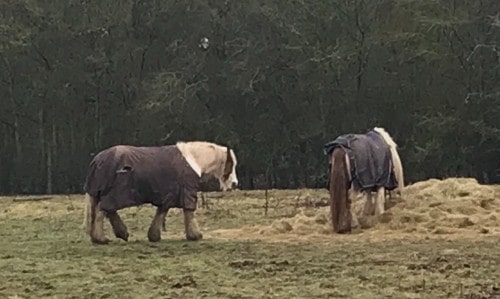
Some horse owners bring their horses indoors to a barn or shelter when it rains. This isn’t always necessary. It depends on the intensity of the rain and the accompanying weather conditions. If it is the middle of winter with cold winds and low temperatures, providing shelter is the best way to help them warm up.
Providing your horse with additional roughage is another way to increase its body temperature. Horses are typically hungrier in cold and rainy conditions and eating helps them generate additional body heat.
Should Horses be Left Out in The Rain?
Not all rainy conditions lead to a horse getting cold. In warmer temperatures, horses are able to regulate their temperature just fine without needing shelter or blankets. Older horses or foals may not handle the rain as effectively.
If a horse has been clipped for the winter months, it will need additional protection from the rain and cold. Owners often clip their horses in the colder months as it prevents a very thick coat from developing which can be difficult to manage when they sweat when being ridden.
Clipped horses will need a blanket in winter, often if it is raining or not, to prevent them from getting cold.
Final Thoughts
Do horses get cold in the rain? Yes, they do but not in all rainy conditions. Horses are hardy animals that have coats that protect them from the rain and cold. However, once rain seeps through to their skin, they may find it difficult to self-regulate their body temperatures and prevent feeling cold.

